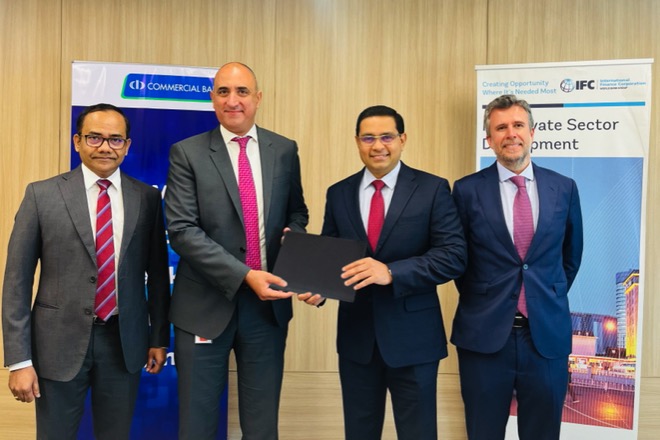The Commercial Bank of Ceylon has announced a collaboration with the International Finance Corporation (IFC) to build a Supply Chain Financing (SCF) strategy that will enable the Bank to lend more to Small and Medium Enterprises (SMEs) and establish itself as a leading SCF bank in Sri Lanka.
IFC has identified Commercial Bank as a strategic banking institution in Sri Lanka to take the position as a leading SCF bank, given its prominent presence in corporate and business banking and its strategically diversified branch network. Commercial Bank is also the largest lender to the country’s SMEs.
SMEs comprise more than 75 percent of enterprises in Sri Lanka and account for 45 percent of employment and 52 percent of the country’s GDP. However, access to finance is considered a key challenge many SMEs face, hindering their growth potential. This latest partnership with IFC will facilitate lending to these enterprises, including those owned by women, the Bank said.
Commenting on the Bank’s initiative, Commercial Bank Managing Director/CEO Sanath Manatunge said developing supply chain financing will help the Bank expand its SME portfolios in a sustainable and risk-mitigated manner. “Although domestic and cross-border supply chain finance is considered a vital opportunity for Sri Lankan financial institutions, it is at an under developed stage,” he elaborated. “The limited capacity of banks and heavy reliance on collateral–based lending are among the key factors which have impacted the growth of SME businesses.”
IFC Country Manager for Sri Lanka and Maldives Alejandro Alvarez de la Campa said: “Small businesses are an engine of growth in Sri Lanka, creating jobs and driving economic growth. Despite their significance, they often struggle to obtain the much-needed working capital for the businesses to survive and thrive. As a longstanding partner of IFC, we have worked alongside Commercial Bank of Ceylon over the years to ramp up access to finance for businesses. This latest partnership will help the Bank strengthen its supply chain financing, enabling it to serve more small businesses and improve their linkages to formal supply chains, paving the way for a better future for Sri Lankan SMEs.”
IFC has a strong track record of enabling access to finance to SMEs through supply chain finance programmes across the globe, and has successfully completed investment transactions and advisory projects with both large companies and financial institutions. IFC also offers comprehensive supply chain finance advisory services that help client financial institutions launch new or scale up existing supply chain finance programmes through market research, business model design, product development, sales process enhancement, technology set up, and credit and risk management.
Commercial Bank’s partnership with the IFC dates back to 2003. IFC has supported the Bank through multiple investments as well as with advisory support.
Commercial Bank is one of the three banks that received support from IFC through a $400 million cross-currency swap facility to help facilitate the imports of essential goods such as food, medicines and fertilizers. Additionally, IFC and Commercial Bank have joined forces to establish an early childhood development center in Batticaloa to help meet the demand for quality childcare services among employed parents in the Eastern Province of Sri Lanka.
In the sphere of sustainable financing, Commercial Bank has twice won IFC’s Climate Assessment for Financial Institutions (CAFI) award for recording the highest number of climate finance transactions in South Asia in a year.
IFC is the largest global development institution focused on the private sector in developing countries. By encouraging growth, IFC advances economic development, creates jobs and improves the lives of people.
Sri Lanka’s first 100% carbon neutral bank and the first Sri Lankan bank to be listed among the Top 1000 Banks of the World, Commercial Bank is a leader in digital innovation in the country’s Banking sector, and has the widest international footprint among Sri Lankan Banks, with 20 outlets in Bangladesh, a Microfinance company in Nay Pyi Taw, Myanmar, and a fully-fledged Tier I Bank with a majority stake in the Maldives.

